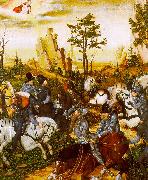Wholesale Oil Painting No Minimum |
|||||||||||
|
|
|||||||||||

|
|||||||||||
|
|
|
||||||||
CRANACH, Lucas the YoungerGerman painter (b. 1515, Wittenberg, d.1586, Weimar) was a German Renaissance artist, known for his woodcuts and paintings. He was a son of Lucas Cranach the Elder who began his career as an apprentice in his father's workshop. Henceforth, his own reputation and fame grew. After his father's death, he assumed control over the workshop. The style of their paintings can be so similar that there have been some difficulties in attribution of their works. |
||||||||
|
|
||||||||
The Conversion of St. Paul
The Conversion of St. Paul Painting ID:: 18965 |
|
|||||||
|
|
||||||||
|
Caravaggio Italian Baroque Era Painter, ca.1571-1610 Italian painter. After an early career as a painter of portraits, still-life and genre scenes he became the most persuasive religious painter of his time. His bold, naturalistic style, which emphasized the common humanity of the apostles and martyrs, flattered the aspirations of the Counter-Reformation Church, while his vivid chiaroscuro enhanced both three-dimensionality and drama, as well as evoking the mystery of the faith. He followed a militantly realist agenda, rejecting both Mannerism and the classicizing naturalism of his main rival, Annibale Carracci. In the first 30 years of the 17th century his naturalistic ambitions and revolutionary artistic procedures attracted a large following from all over Europe. The conversion of St. Paul MK169 ca.1601.Doek 230x175cm S. Maria divide Popolo Rome |
||||||||
|
|
||||||||
|
Prev Next
|
||||||||
|
|
||||||||
|
Related Paintings to Caravaggio :. |
||||||||
|
|
||||||||
|
CONTACT US |

